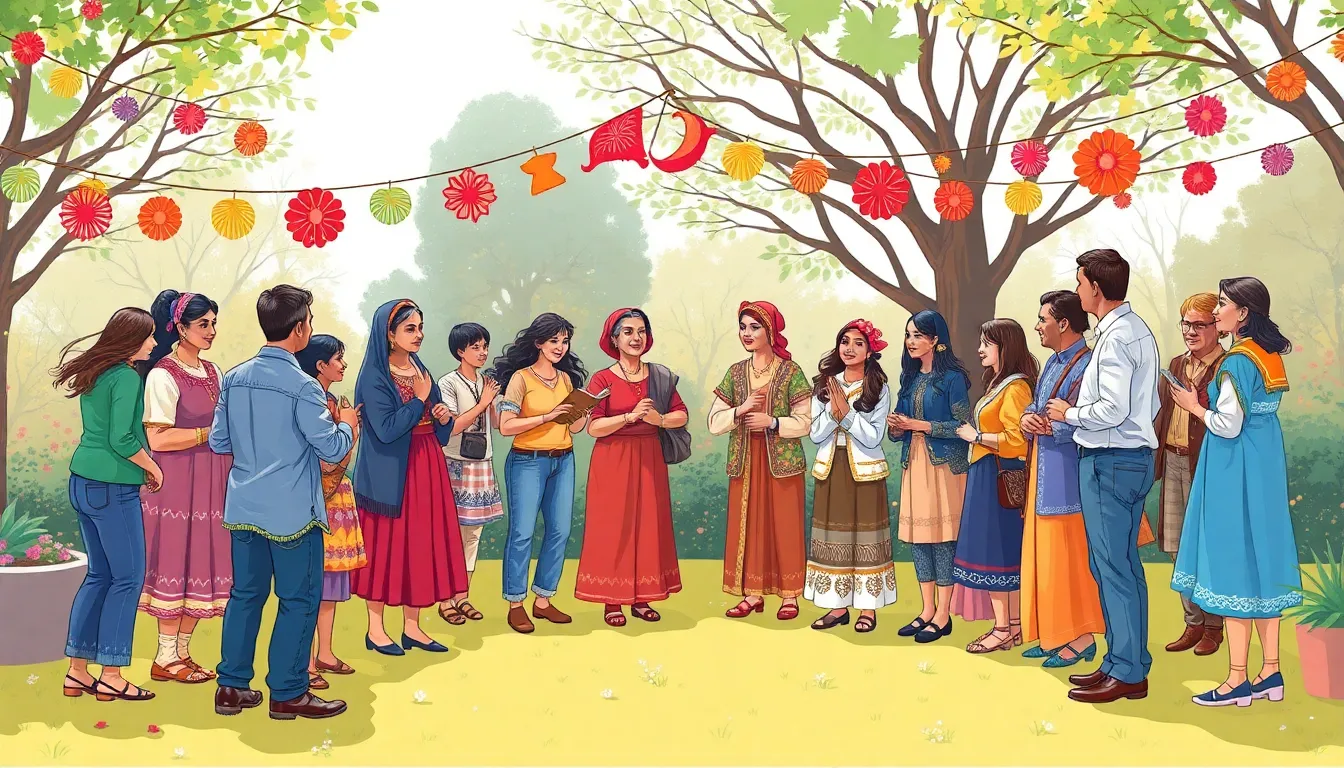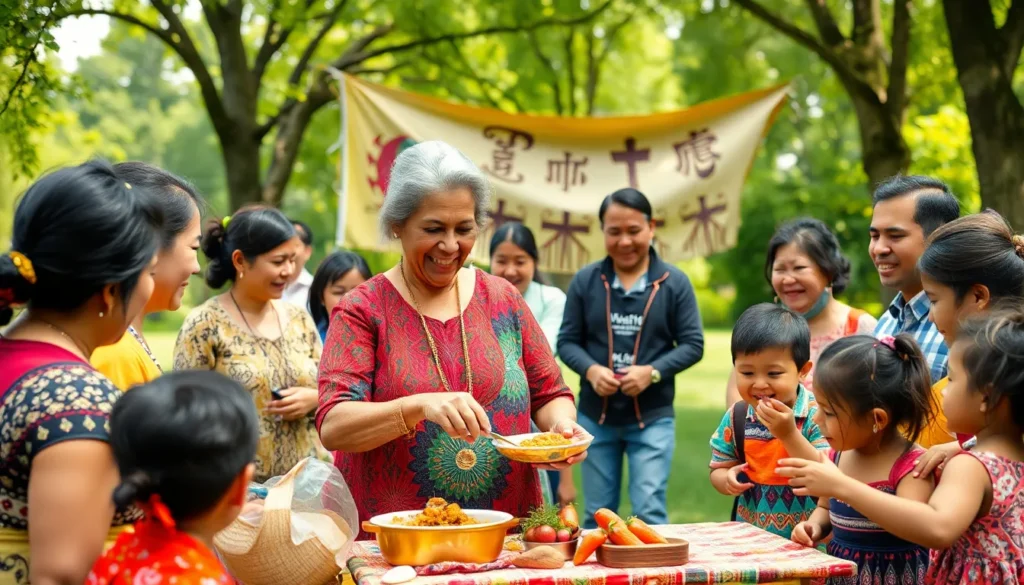Table of Contents
ToggleCultural identity isn’t just a buzzword; it’s the colorful tapestry that weaves together traditions, values, and quirks that make each community unique. Ever wondered why your grandma insists on making that peculiar dish at every family gathering? Spoiler alert: it’s not just for the taste! It’s a delicious nod to her cultural roots, and it’s what keeps the family stories alive.
Understanding Identidad Cultural
Cultural identity encompasses the shared characteristics and values that connect individuals within a community. This connection often influences interpersonal relationships and influences perspectives.
Definition and Importance
Cultural identity refers to the sense of belonging to a specific group, shaped by shared customs, traditions, and experiences. Understanding cultural identity fosters respect for diversity, promotes social cohesion, and enhances intercultural communication. Recognition of cultural identity allows individuals to celebrate their heritage while learning from others.
Elements of Cultural Identity
Key elements of cultural identity include language, traditions, beliefs, and values. Language serves as a primary means of communication and reflects cultural nuances. Traditions, such as rituals or celebrations, provide continuity and a sense of belonging. Beliefs and values shape how individuals perceive the world and influence behavior and attitudes. These elements intertwine to create a distinctive cultural identity that enriches communities.
Factors Influencing Identidad Cultural

Cultural identity forms a complex framework influenced by various factors, including family, ancestry, and historical events.
Family and Ancestry
Family lineage plays a crucial role in shaping cultural identity. Connections to ancestors establish a sense of belonging. Traditions passed down through generations, such as storytelling and seasonal celebrations, maintain cultural continuity. Each family member contributes unique narratives that enrich the overall identity. Language spoken within the family reinforces ties to heritage. This intimate knowledge of ancestry provides individuals with a deeper understanding of their roots. Bonds formed through shared experiences enhance communal ties, fostering a cohesive identity within a larger context.
Historical Events
Historical events significantly impact cultural identity. Major occurrences, such as wars and migrations, shape community narratives and collective memory. These events inform values and beliefs retained over time. Significant moments often inspire cultural resistance or adaptation, creating a dynamic identity landscape. Social movements can also redefine understandings of belonging and identity. Memories of past struggles and triumphs inform present-day cultural expressions, solidifying a community’s unique characteristics. Shared experiences during key historical events foster solidarity among members, establishing a stronger sense of identity.
The Role of Identidad Cultural in Society
Identidad cultural plays a vital role in shaping social structures and community dynamics. It fosters a sense of belonging and unity among individuals within diverse groups.
Community and Belonging
Cultural identity connects individuals to their communities, creating strong interpersonal bonds. Individuals feel a sense of inclusion and pride as they participate in shared rituals and traditions. Groups often gather through cultural events, enhancing collective memories and reinforcing ties. Relationships deepen when people experience a shared heritage, leading to mutual respect and understanding. Communities thrive when members embrace their unique cultural characteristics, contributing to a rich social fabric that nurtures collaboration and support.
Cultural Expression and Preservation
Cultural expression serves as an important vehicle for preserving identity, showcasing distinctive traditions and practices. Art, music, and storytelling embody cultural narratives, allowing generations to connect with their roots. Preservation of language highlights connections to ancestry, ensuring the transmission of cultural knowledge. Festivals and ceremonies celebrate heritage, attracting participation and engagement from younger members. Vibrant expressions of culture foster resilience, allowing communities to adapt while maintaining their unique identities.
Challenges to Identidad Cultural
Various challenges impact cultural identity today, affecting how communities perceive and maintain their unique characteristics.
Globalization and Cultural Homogenization
Globalization leads to greater access to international cultures, often overshadowing local traditions. Individuals frequently encounter a blend of global influences that dilute distinct cultural expressions. Many communities face pressure to adopt popular customs at the expense of their own practices. This phenomenon fosters a sense of sameness, limiting the diversity that cultural identity thrives on. Statistics show that as globalization increases, more than 60% of unique languages risk extinction within the next century. The dominance of global media and entertainment channels contributes significantly to this loss of cultural uniqueness.
Loss of Tradition
Societal changes contribute to the loss of traditional practices. Families migrate frequently, separating them from their cultural roots. Younger generations may not engage with ancestral traditions, opting instead for modern lifestyles. Educational systems often prioritize universal narratives, neglecting local histories and cultures. This neglect cultivates a disconnect, prompting communities to struggle in passing down customs. Recent data indicates that over 50% of traditional rituals face decline due to urbanization and technological advancement. The gradual erosion of traditions undermines cultural identity, impairing communal ties and continuity.
Cultural identity plays a vital role in shaping communities and fostering connections among individuals. It’s a dynamic blend of traditions and values that not only defines who people are but also enriches their social interactions. As globalization and societal changes challenge the preservation of unique cultural expressions, the importance of maintaining these identities becomes even more critical.
Strengthening cultural ties through family practices and community engagement can help combat the pressures of homogenization. By celebrating and sharing their heritage, communities can ensure that their distinctive identities thrive for future generations. Embracing cultural diversity enhances mutual respect and understanding, ultimately contributing to a more cohesive and vibrant society.







